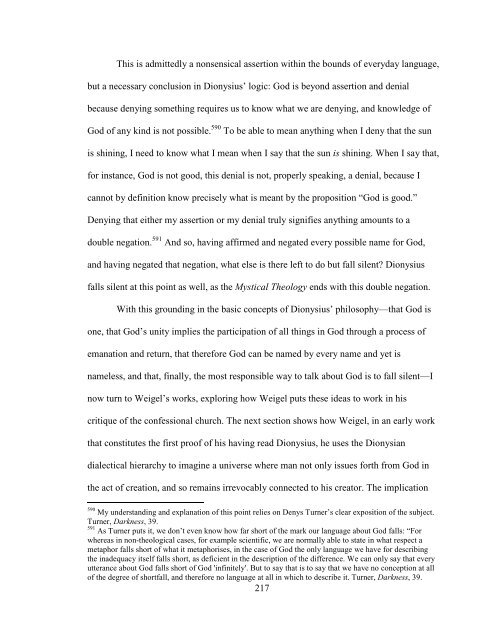the mystical theology of valentin weigel - DataSpace at Princeton ...
the mystical theology of valentin weigel - DataSpace at Princeton ...
the mystical theology of valentin weigel - DataSpace at Princeton ...
Create successful ePaper yourself
Turn your PDF publications into a flip-book with our unique Google optimized e-Paper software.
This is admittedly a nonsensical assertion within <strong>the</strong> bounds <strong>of</strong> everyday language,<br />
but a necessary conclusion in Dionysius’ logic: God is beyond assertion and denial<br />
because denying something requires us to know wh<strong>at</strong> we are denying, and knowledge <strong>of</strong><br />
God <strong>of</strong> any kind is not possible. 590 To be able to mean anything when I deny th<strong>at</strong> <strong>the</strong> sun<br />
is shining, I need to know wh<strong>at</strong> I mean when I say th<strong>at</strong> <strong>the</strong> sun is shining. When I say th<strong>at</strong>,<br />
for instance, God is not good, this denial is not, properly speaking, a denial, because I<br />
cannot by definition know precisely wh<strong>at</strong> is meant by <strong>the</strong> proposition “God is good.”<br />
Denying th<strong>at</strong> ei<strong>the</strong>r my assertion or my denial truly signifies anything amounts to a<br />
double neg<strong>at</strong>ion. 591 And so, having affirmed and neg<strong>at</strong>ed every possible name for God,<br />
and having neg<strong>at</strong>ed th<strong>at</strong> neg<strong>at</strong>ion, wh<strong>at</strong> else is <strong>the</strong>re left to do but fall silent? Dionysius<br />
falls silent <strong>at</strong> this point as well, as <strong>the</strong> Mystical Theology ends with this double neg<strong>at</strong>ion.<br />
With this grounding in <strong>the</strong> basic concepts <strong>of</strong> Dionysius’ philosophy—th<strong>at</strong> God is<br />
one, th<strong>at</strong> God’s unity implies <strong>the</strong> particip<strong>at</strong>ion <strong>of</strong> all things in God through a process <strong>of</strong><br />
eman<strong>at</strong>ion and return, th<strong>at</strong> <strong>the</strong>refore God can be named by every name and yet is<br />
nameless, and th<strong>at</strong>, finally, <strong>the</strong> most responsible way to talk about God is to fall silent—I<br />
now turn to Weigel’s works, exploring how Weigel puts <strong>the</strong>se ideas to work in his<br />
critique <strong>of</strong> <strong>the</strong> confessional church. The next section shows how Weigel, in an early work<br />
th<strong>at</strong> constitutes <strong>the</strong> first pro<strong>of</strong> <strong>of</strong> his having read Dionysius, he uses <strong>the</strong> Dionysian<br />
dialectical hierarchy to imagine a universe where man not only issues forth from God in<br />
<strong>the</strong> act <strong>of</strong> cre<strong>at</strong>ion, and so remains irrevocably connected to his cre<strong>at</strong>or. The implic<strong>at</strong>ion<br />
590 My understanding and explan<strong>at</strong>ion <strong>of</strong> this point relies on Denys Turner’s clear exposition <strong>of</strong> <strong>the</strong> subject.<br />
Turner, Darkness, 39.<br />
591 As Turner puts it, we don’t even know how far short <strong>of</strong> <strong>the</strong> mark our language about God falls: “For<br />
whereas in non-<strong>the</strong>ological cases, for example scientific, we are normally able to st<strong>at</strong>e in wh<strong>at</strong> respect a<br />
metaphor falls short <strong>of</strong> wh<strong>at</strong> it metaphorises, in <strong>the</strong> case <strong>of</strong> God <strong>the</strong> only language we have for describing<br />
<strong>the</strong> inadequacy itself falls short, as deficient in <strong>the</strong> description <strong>of</strong> <strong>the</strong> difference. We can only say th<strong>at</strong> every<br />
utterance about God falls short <strong>of</strong> God 'infinitely'. But to say th<strong>at</strong> is to say th<strong>at</strong> we have no conception <strong>at</strong> all<br />
<strong>of</strong> <strong>the</strong> degree <strong>of</strong> shortfall, and <strong>the</strong>refore no language <strong>at</strong> all in which to describe it. Turner, Darkness, 39.<br />
217
















